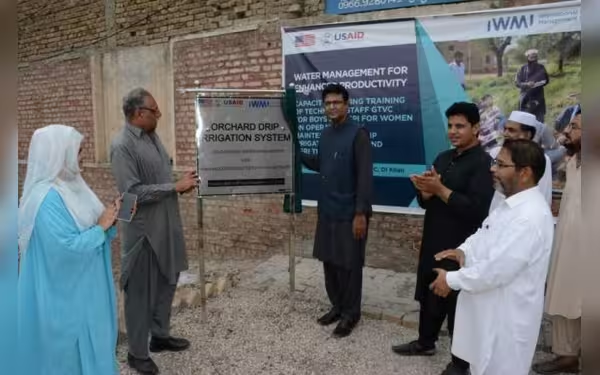Saturday, October 5, 2024 08:31 AM
USAID Enhances Agricultural Skills in DI Khan
- USAID launches vocational training in DI Khan.
- Drip irrigation training improves water management.
- TEVTA establishes Hydraulic and Drip Irrigation Lab.
 Image Credits: urdupoint
Image Credits: urdupointUSAID enhances vocational skills in DI Khan, focusing on modern agricultural technologies and efficient water management.
In recent years, Pakistan has faced significant challenges in water management, particularly in agricultural regions where efficient water use is crucial for sustainable farming practices. The Gomal Zam Dam command area, known for its arid conditions, has been at the forefront of these challenges. To address these pressing issues, USAID has launched initiatives aimed at enhancing vocational skills in modern agricultural technologies, particularly focusing on water management.
One such initiative is the Water Management for Enhanced Productivity (WMfEP) program, which recently concluded a five-day Training of Trainers (ToT) workshop at the Government Technical Vocational Center (GTVC) in DI Khan. This workshop, conducted in collaboration with the Technical Education and Vocational Training Authority (TEVTA), aimed to equip TEVTA faculty with essential skills in operating and maintaining drip irrigation systems and other modern agricultural technologies.
The training engaged 25 participants, including 16 men and 9 women, who were primarily engineers and diploma holders. The focus was on bridging the knowledge gap in managing high-efficiency irrigation systems, which are vital for improving water productivity and increasing farm household incomes. Drip irrigation, in particular, is a game-changer, allowing farmers to use water more efficiently, thereby enhancing their livelihoods.
Dr. Azeem Ali Shah, the Chief of Party for WMfEP, highlighted the significance of this initiative, stating, "This initiative will not only empower local communities by providing them with the tools and knowledge to manage their water resources efficiently, but it also contributes to broader socio-economic development." His words underscore the potential impact of such training on agricultural productivity and food security in the region.
Moreover, Mr. Mansoor Qaiser Weha, the Managing Director of TEVTA KP, expressed pride in being the first institution in Pakistan to establish a Hydraulic and Drip Irrigation Lab with USAID's support. He announced plans for a certification course in Drip Irrigation across Khyber Pakhtunkhwa, aiming to reach more young farmers and technicians. This step is crucial for supporting Pakistan's national development goals and ensuring that the benefits of modern agricultural practices are widely disseminated.
As Pakistan grapples with water scarcity, the introduction of drip irrigation systems through such training programs is essential. These systems not only optimize water use but also ensure that crops receive adequate hydration, which is vital for improving crop yields and contributing to national food security. By building local capacity through vocational training centers like TEVTA, the initiative ensures that knowledge is retained and passed on to future generations of farmers and technicians.
The collaboration between USAID, IWMI, and TEVTA represents a significant step towards addressing the urgent need for efficient water management in Pakistan. By empowering local educators and farmers, the WMfEP aims to create long-term solutions for water productivity, ultimately contributing to a stable and prosperous Pakistan. As communities become more self-sufficient in managing modern agricultural technologies, they will be better equipped to face the challenges posed by climate change and water scarcity, paving the way for a more sustainable future.













